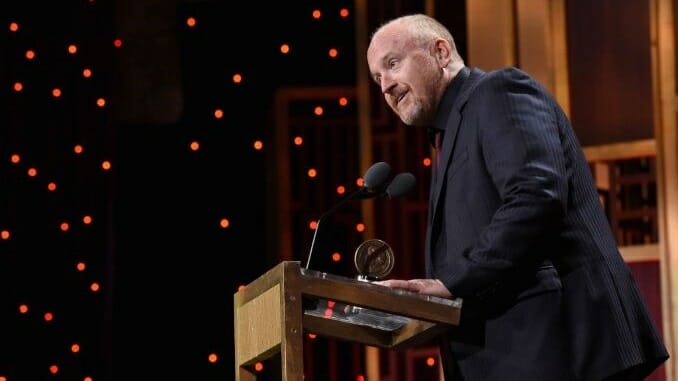Nobody Needs a Best Comedy Album Grammy
Photo courtesy of Getty Images
The woke internet mob strikes again as “cancelled” comedians Louis C.K. and Kevin Hart have been burdened with their third and second Grammy nomination, respectively. It might come as a surprise to some that C.K., who admitted to multiple acts of sexual misconduct in 2017, quietly released an album this year. It might also surprise some that Kevin Hart could in any way claim to have been “cancelled,” as stepping away from an Oscars hosting gig didn’t slow down his stand-up or Hollywood career in the slightest. Others might be surprised that there even is a Grammy for Best Comedy Album (understandably). Is this a sign that someone as problematic as C.K. is bouncing back, or that the Grammys are so largely out of touch with the comedy world that this accolade holds no relevance anymore? Considering both men have remained wildly rich, booked and busy throughout their so-called “cancellations,” I’d venture it’s the latter.
The major entertainment arts institutions are regularly criticized by comedians for not valuing comedic works. As much as this lack of reverence shows in comedy’s absence from these papers and ceremonies, it’s just as apparent when they do get the spotlight. The sitcoms and films that catch the eye of prestige gatekeepers tend to be dramedies that lean more on the drama side, and when the Grammys look at stand-up, their gaze falls only on celebrities.
The Recording Academy nominated Lavell Crawford, Chelsea Handler, Nate Bargatze, and Lewis Black alongside Hart and C.K. for it’s only comedy award, Best Comedy Album, for the upcoming 64th Annual Grammy Awards. Bo Burnham’s Inside, arguably the most popular special of the year with both critics and fans, was not considered eligible (it was instead nominated for Best Music Film and Best Song Written for Visual Media). The Grammys offered no explanation as to why, but it is speculated to be due to its initial release via Netflix that swayed the review committee, and yet that goes for nearly all their past nominees. The Netflix association didn’t prevent Chris Rock. from securing a 2019 nomination for his special Tamborine (directed by Burnham) nor did it stop Dave Chappelle from winning the award in 2018, 2019, and 2020 for the first three specials of his ridiculously huge multi-special deal with the streamer. It’s actually quite a rarity for any nominated work to be made purely for an audio medium. The 2022 nominees are highly indicative of how the Grammys treats the genre. If you want to be considered, you have to be a household name, be over 40 years old, have millions in the bank, host a talk show, and/or star in a slew of just-ok feature films. It’s a tier that is extremely exclusive.
Despite its many contributions to the entertainment industry, stand-up comedy at its base is still a niche interest. Musical guests and acrobatic dogs get more late night gigs despite those programs being helmed by fellow comedians, and showcase shows have largely died off as Comedy Central has pushed its stand-up content mostly online. You have to be a comedy nerd and seek out new talent on your own, as the mainstream media is unlikely to help you stumble upon it. I bet the average person can only name 10 stand-up comedians, half of whom are dead, and are likely better known for their acting roles than their actual stage material. For the Grammys, their rolodex seems even smaller.
-

-

-

-

-

-

-

-

-

-

-

-

-

-

-

-

-

-

-

-

-

-

-

-

-

-

-

-

-

-

-

-

-

-

-

-

-

-

-

-








































